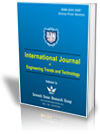Micro Controller Based Energy Efficient Four Steps Charging of a Capacitor Using a Buck Converter with Consecutive Changes of its Duty Ratio
Citation
Mohammad Sehon Pasha, G.C.Prabhakar"Micro Controller Based Energy Efficient Four Steps Charging of a Capacitor Using a Buck Converter with Consecutive Changes of its Duty Ratio", International Journal of Engineering Trends and Technology (IJETT), V27(2),89-93 September 2015. ISSN:2231-5381. www.ijettjournal.org. published by seventh sense research group
Abstract
Since the discovery of Electricity, we have
sought effective methods to store that energy for use
on demand. Energy efficiency is “using less energy to
provide the same service”. A capacitor can store
maximum energy with respect to input by using direct
charging method. In this paper four steps charging of
capacitor by consecutively changing the duty cycle of
Buck converter. In four step charging, dissipation
energy is reduced to one 4th when compared with the
conventional direct charging. The reduced dissipated
energy is verified by MATLAB simulations and by
breadboard experiment with help of Micro controller,
which an energy reduction of one fourth is confirmed
from the measured power supply currents in four step
charging.
References
[1] L. J. Svensson and J. G. Koller, “Driving a capacitive load
without dissipating fcv2 ,” in Proc. IEEE Symp. Low Power
Electron., 1994,pp. 100–101.
[2] W. C. Athas, “Energy-recovery CMOS,” in Low Power Design
Methodologies, J. M. Rabey and M. Pedram, Eds. Norwell,
MA,USA: Kluwer, 1996, pp. 65–100.
[3] Y. Moon and D. K. Jeong, “An efficient charge recovery logic
circuit,” IEEE J. Solid-State Circuits, vol. 31, no. 4, pp. 514–
522, Apr. 1996
[4] R. Lal, W. Athas, and L. Svensson, “ A low power adiabatic
driver system for AMLCDs,” in Proc. IEEE Symp. VLSI
Circuits, 2000, pp. 198–201.
[5] S. Kim and M. C. Papaefthymiou, “True single-phase adiabatic
circuitry,” IEEE Trans.VLSI Syst., vol. 9, no. 1, pp. 52–63,
Jan. 2001.
[6] A. Blotti and R. Saletti, “Ultralow-power adiabatic circuit semicustom
design,” IEEE Trans. VLSI Syst., vol. 12, no. 11, pp.
1248–1253, Nov. 2004.
Keywords
Adiabatic circuit, conventional direct
charging method, step wise charging, duty ratio.



